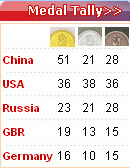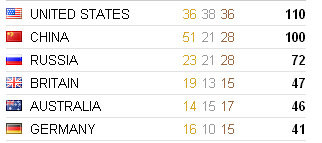By Dr. C.A. Tuggle, professor with University of North Carolina at Chapel Hill
The Olympics are over, but the battle about which country can rightfully claim medal supremacy rages on. In China, and most of the rest of the world, that determination is based on the number of gold medals won. In the U.S., it's based on the total number of medals.
Both approaches are fundamentally flawed. To count only gold medals makes silver and bronze relevant only in case of a tie and disrespects the accomplishments of winners of the "lesser" medals.
Consider, for example, if Michael Phelps were the lone Olympics representative of the country of Phelpsylvania. Swimming's superman would single-handedly have put his country at number ten on the list, ahead of France with 40 total medals but only 7 golds. Phelps' 8th gold would have, in effect, trumped the combination of 33 silver and bronze medals. Despite the Chinese saying that "one gold equals a thousand silvers", such thinking is wrong headed and goes against the Olympic spirit. Why even give silver and bronze medals?
Country rank by gold medals won (top 12)
1. China - 51
 |
|
Country rank by gold medals won (top 5) |
2. USA - 36
3. Russia -23
4. Great Britain - 19
5. Germany -16
6. Australia -14
7. South Korea - 13
8. Japan - 9
9. Italy - 8
10. "Phelpsylvania" - 8
11. France - 7
12. Ukraine - 7
Country rank by total medals won (top 12)
|

|
|
Country rank by total medals won (top 5) |
1. USA - 110
2. China -100
3. Russia -72
4. Great Britain - 47
5. Australia - 46
6. Germany - 41
7. France - 40
8. South Korea - 31
9. Italy -28
10. Ukraine - 27
11. Japan - 25
12. Cuba - 24
Conversely, to count all medals equally is just as counter-intuitive. Gold does not equal silver and does not equal bronze. If it did, the medal podiums would be the same height, one flag would not wave above the others, and fans would hear the anthems of three countries, not just one. Hence, it's necessary to assign some sort of points scale to the medals to determine which country came out on top. Some in the blogosphere have suggested basing such a scale on the relative worth of the metal in the medals. We should discount this suggestion out of hand for two reasons. First, at current prices, gold is worth about 65 times more than silver, which is about 9 times more valuable than bronze. Josafa Idem's (ITA) silver medal in women's K1 500m., a canoe/kayak flat water event in which Inna Osypenko-Radomska (UKR) crossed the line four one-thousandths of a second ahead of Idem, is hardly 1/65th as valuable as the gold. In addition, there's very little gold in a gold medal - a minimum of only 6 grams by IOC rule. A gold medal is mostly silver.
Others have suggested a scale based on reverse order of finish, with the gold medalist earning 3 points for his or her country, the silver medalist 2, and the bronze medalist 1. A similar suggestion is a 5-3-1 scale, which the organizers of the 1908 London Games used. Both seem less than ideal, because the difference between a gold and a silver is the same as the difference between a silver and a bronze.
So the question remains, what should be the relative worth of the various medals? The USOC has already answered the question. America's governing body for Olympics competition awards prize money to Olympic medal winners. U.S. gold medalists in Beijing will get $25,000, with silver and bronze resulting in prizes of $15,000 and $10,000 respectively. Using that ratio would put the point value of the various medals at 5, 3, and 2 points. Such a scale values the accomplishments of all medalists, while putting a decided premium on winning gold. Based on this scale, China had a slight lead heading into the final day of competition, 361 to 353 for the U.S. The Chinese started the day with a gold in boxing, which the U.S. matched in men's volleyball. The Chinese kept pace with a U.S. gold in men's basketball and a silver in men's water polo, with another gold and silver in boxing. Unless one chooses to stubbornly cling to total medal count as the indictor of a country's medal success, we must conclude that China outperformed the U.S. at the Beijing Olympics.
Country rank using weighted scale (top 12)
1. China - 374
2. USA - 366
3. Russia - 234
4. Great Britain - 164
5. Australia - 149
6. Germany - 140
7. France - 117
8. South Korea - 111
9. Italy - 90
10. Japan - 83
11. Ukraine - 80
12. Cuba - 65
It's easy to look at the Beijing Games, in terms of U.S. performance, and wish "if only." If only the men's 4x100 relay team hadn't dropped the baton in preliminaries. If only the women's 4 X100 relay team hadn't made the same terrible mistake. If only U.S. shooter Matthew Emmons hadn't botched his final shot, giving the gold to his Chinese competitor. If only the once-vaunted U.S. boxing program had even one athlete competing on the final day.
Perhaps we should assign different weights to medals based on the sport. Should a gold in equestrian really count as much as the gold in decathlon? Maybe we should factor in a country's population.
If only.
(China.org.cn August 25, 2008)